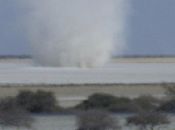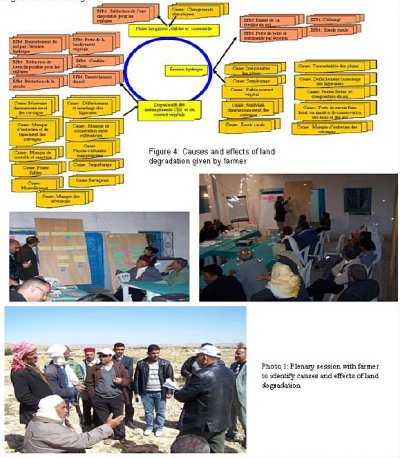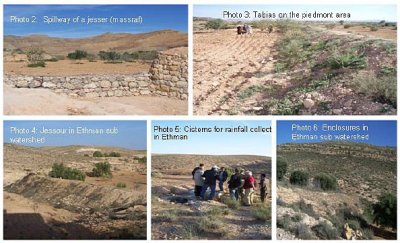|
Identifying strategies: Stakeholder Workshop 1 |
 |
|
A report on the results of the first DESIRE stakeholder workshop on "Land degradation and desertification - existing and potential prevention and mitigation strategies" held in the Oum Zessar watershed, 10-12 March 2008.
|
The workshop objectives were to identify existing and potential strategies for land remediation.
- To initiate a mutual learning process among local and external participants by sharing experience and jointly reflecting on current and potential problems and solutions regarding land degradation and desertification.
- To identify existing and new strategies to prevent or mitigate land degradation and desertification.
- To select a set of these identified stragegies for further evaluation and documentation with the WOCAT methodology
|
Study area
| The study area is located in the southern part of Tunisia. These catchment areas (whose surface is around 892 km2) are drained by two principal wadis: wadi Hallouf in the west part and wadi Oum Zessar. The latter runs out since the mountain chain of Beni Khache crosses the northern delegation of Médenine and reaches the delegation of Sidi Makhlouf to flow in Sebkhas Oum Zessar before reaching the sea. The highest part of the watershed reaches an altitude of 713 m on the level of Jbel Moggar. |
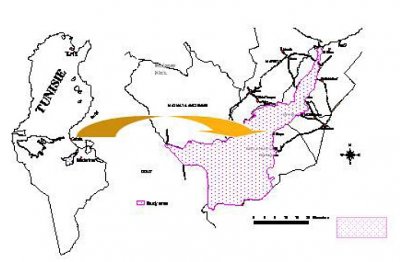 |
Land use and production systems
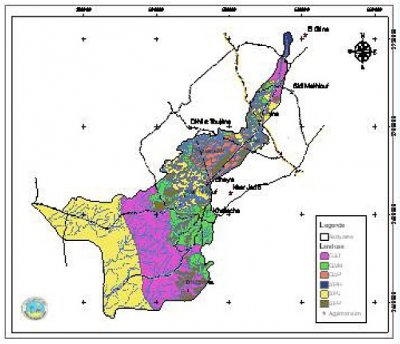 |
In the study area, most rainfed farming is based on water harvesting techniques (WHT). This sector is, and will remain, an important component of the region's agricultural production system. Rainfed agriculture grown under WHT play an important role in rural development, but its productivity is, however, low compared with those in countries of the Mediterranean basin and severely limited by chronic rainfall deficits. |
| Three production systems are identified. |
- Mixed crop-livestock production system
- Rainfed agricultural systems grown under soil and water harvesting techniques
- Rainfed annual crops
|
Methodology
In order to represent different forms of land degradation and techniques of soil and water conservation used in the study area, different methodological tools are used and adapted to the Tunisian context
- Photo language and water cycle
- Transect walk
- Plenary work and group works with farmer
- Plenary session: presentation and discussion of group work
- Problem tree
- WOCAT technology
|
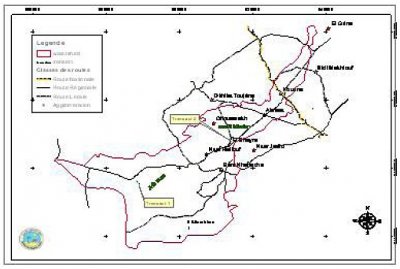 |
Causes and effects of land degradation
The main causes and effects of land degradation given by farmers are shown opposite. Phycical, socio-economic and institutional aspects are considered as the main factors of land degradation in the region.
|
Solutions already applied at the local level
The main technologies used in the study area are
- Watershed treatment (consisting of jessour in the mountain area and tabias in the piedmont)
- Consolidation of SWC works (pastoral and fruit tree plantations)
- Surface water mobilization (three types of structures have been installed: recharge units, flood spreading units and cisterns)
- Enclosures (rangeland resting)
|
Recommendations and difficulties encountered
- There is a rich local knowledge to cope with natural resources, but a dialogue is required between stakeholders and scientists to guarantee successful implementation of SWC strategies.
- The causes and effects of land degradation are more complex in arid zones.
- The learning approach is not very easy for the local stakeholders to understand.
- The full and active participation of the stakeholders needs a lot of patience and mutual trust.
|

